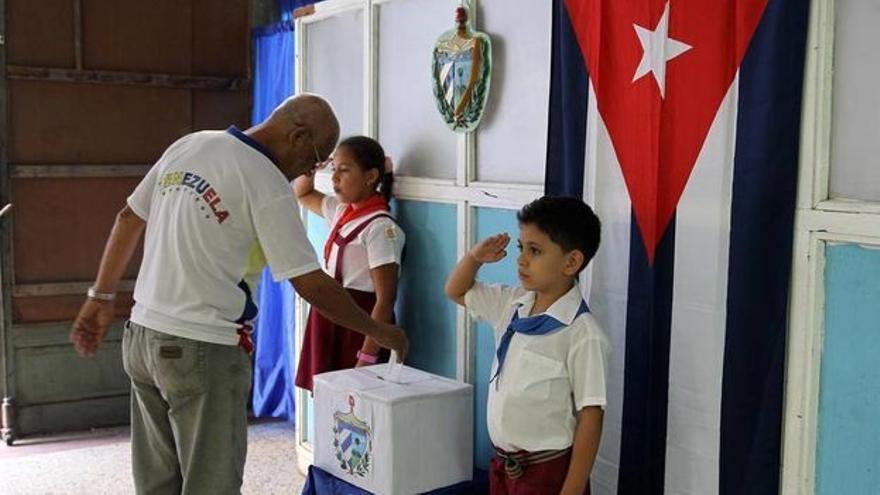
![]() 14ymedio, Carlos Alberto Montaner, Miami, 23 February 2019 — CubaData has surveyed Cuban society. It has asked people about the new Constitution that will be voted on in the referendum on February 24. According to the sample, 42.4% will say Yes, 41.6% will opt for the No and 16% will not vote. It is a “technical draw,” but the No votes, plus those who will not vote, account for 57.6% of the electoral rolls, despite the fact that the No supporters have been denied access to radio, television or national written media, in the middle of a fierce campaign of intimidation, threats, beatings and arrests.
14ymedio, Carlos Alberto Montaner, Miami, 23 February 2019 — CubaData has surveyed Cuban society. It has asked people about the new Constitution that will be voted on in the referendum on February 24. According to the sample, 42.4% will say Yes, 41.6% will opt for the No and 16% will not vote. It is a “technical draw,” but the No votes, plus those who will not vote, account for 57.6% of the electoral rolls, despite the fact that the No supporters have been denied access to radio, television or national written media, in the middle of a fierce campaign of intimidation, threats, beatings and arrests.
Defending a No vote is equivalent to “treason to the fatherland.” Among others, Guillermo Toledo, from Puerto Rico, director of the Cuban National Meeting, and Rosa Maria Payá, from everywhere, in charge of Cuba Decides, have been able to “sneak in” working very hard for the few slots in the social networks that Cuban State Security has not managed to close. To this is added the indefatigable work of the dissidents: there are more than 100 Cubans on hunger strike in support of No vote, led by José Daniel Ferrer, a legendary dissident who has suffered constant condemnations and beatings.
CubaData is a company associated with the Diario de Cuba, a good digital newspaper published in Madrid. It is presided over by journalist Pablo Díaz and co-directer Salvi Pascual, a university professor and great computer expert. The survey was conducted a few days before the referendum. They asked 1,000 Cubans throughout the country. The results are compatible with the simple observation of the Cuban disaster and with what happened in the Eastern European nations subjected to communism.
After all, Cubans are the same as other human beings. Sixty years of failures, unfulfilled promises and conspicuous deterioration, make a dent in the perceptions of any society. You have to be profoundly idiotic to maintain illusions in an inflexible system directed exclusively by the Communist Party, without counterweights or independent evaluations, despite the horror stories of an island subject to the whims of trying to grow coffee on rocky outcrops, immense dairy cows from the stage of Soviet gigantism, or the plan for sweet dwarf cows that each family would keep in their living room to stock up on milk when the communist world collapsed.
This is not the first time that a reliable survey has been carried out in Cuba. At the end of 2014, the engineer Joaquín Pérez-Rodríguez, head of The Campol Group, and, today also president of the Pedro Arrupe Institute, set out to find out what Cubans on the Island wanted. With with the help of several mathematicians and sociologists, he managed to carry out an unofficial evaluation which showed that 82% of people between 18 and 49 years were “not satisfied” with the economic system that exists in Cuba. The percentage of dissatisfaction fell to 71% in those over 50. He relates it, very descriptively, in his book La voz cubana (The Cuban Voice).
These differences in the preferences between “young” and “old,” or between “urban” and “rural” populations, are typical of any society. Young people believe in the future, want to succeed, travel abroad, break out, be entrepreneurs. The old are more conservative, they tend to fear changes. A government that has completed 60 years in absolute control of society has necessarily suffered tremendous waste and has no emotional connection with its contemporaries.
It doesn’t surprise me, then, what José Gabriel Barrenechea says from Cuba, that in Havana the No vote is backed by the youth. He affirms this in his article What will happen this Sunday in Cuba? Although I also share his pessimism about the final results: “I have no doubt that, in any case, there will be electoral fraud.” And then he explains how and why: “In the Municipal Commissions data will be altered by orders of the first municipal secretaries, so as not to look bad before their superior authorities […] Nobody wants to lose the ’little benefits’ attached to any important position in Cuba, supposedly socialist.”
Another writer, who prefers not to give his name for fear of reprisals, explains to me how some people who totally reject the system will vote Yes: it is the custom of the double standard typical of totalitarian societies. They are painfully accustomed to the dissonance between what they believe, what they say and what they do. The inertia generated by 60 years of one-party government also prevails. In the elections the vote is always what the Government indicates. I remember a candidate from the end of the Franco regime in Spain, in the first half of the seventies, who had a sincere and candid way of asking for a vote: “Vote for me. What more can he give you?”
_____________________________
The 14ymedio team is committed to serious journalism that reflects the reality of deep Cuba. Thank you for joining us on this long road. We invite you to continue supporting us, but this time by becoming a member of 14ymedio. Together we can continue to transform journalism in Cuba.
